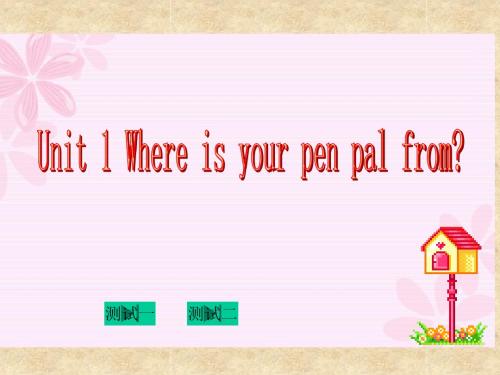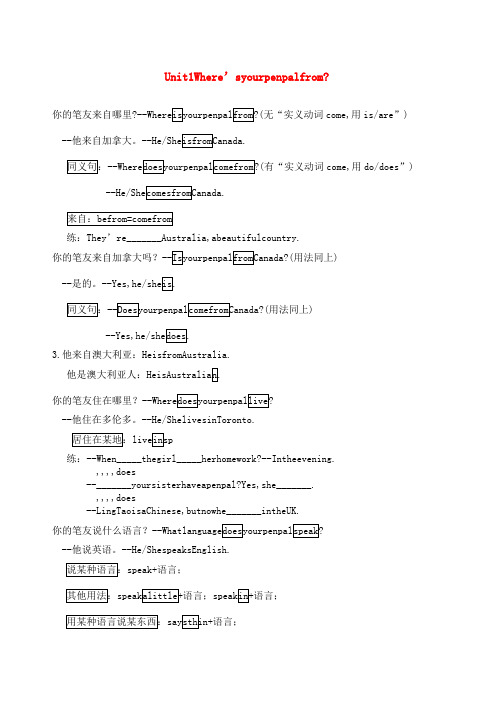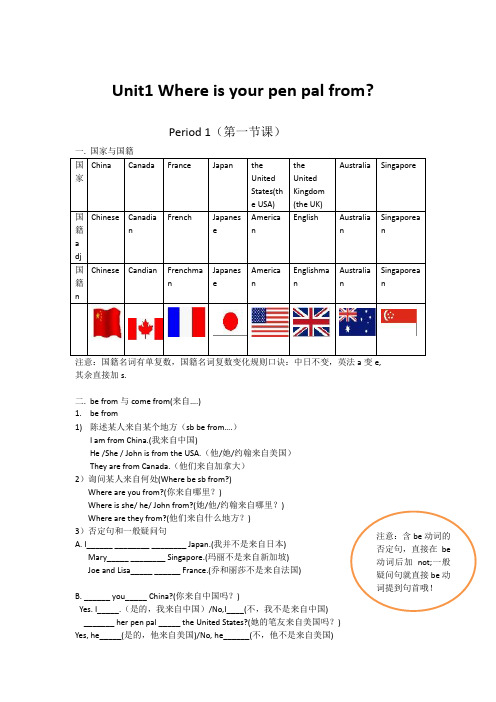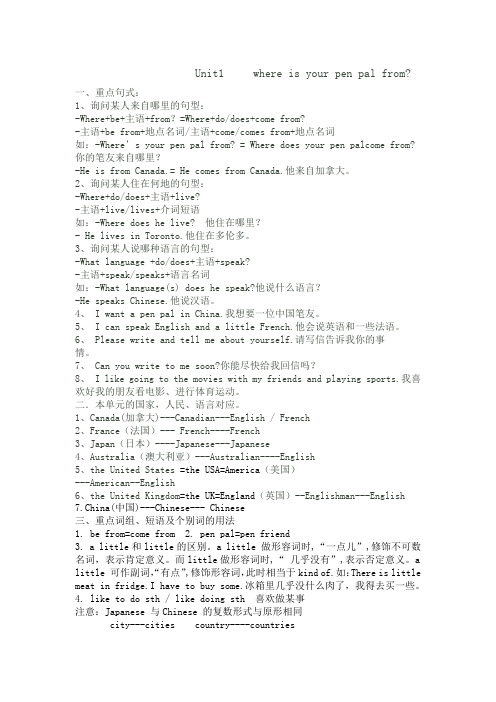Unit1 Where's your pen pal from知识点
- 格式:wps
- 大小:28.50 KB
- 文档页数:2


Unit1Where’syourpenpalfrom?你的笔友来自哪里无“实义动词come,用is/are”)--他来自加拿大。
有“实义动词come,用do/does”)练:They’re_______Australia,abeautiful country.你的笔友来自加拿大吗?用法同上)--是的。
用法同上)3.他来自澳大利亚:HeisfromAustralia.他是澳大利亚人:你的笔友住在哪里?--他住在多伦多。
--He/ShelivesinToronto.练:--When_____thegirl_____herhomework?--Intheevening.,,,,does--_______yoursisterhaveapenpal?Yes,she_______.,,,,does--LingTaoisaChinese,butnowhe_______intheUK.你的笔友说什么语言?--他说英语。
--He/ShespeaksEnglish.speak+语言;语言;语言;语言;saytosbtellsb练:Mynewpenpal________methathecan________Chinesebutonlyalittle.Ican’t________French,butIcan________itinEnglish.6.我喜欢和我的朋友一起去看电影:gotothemoviesseeamovie7.写信给某人:互相写信:writee-mailstoeachother8.9.告诉我关于你自己:讲故事给某人听:10.11.相似单词比较:(1)信:letter一点:little(2)法国:France法语:French12.(1)likev.喜欢;如:(2)likeprep.像;如:13.(1)countryn.国家;如:(2)countryn.14.(1)fromperp.来自;如:(2)fromprep.Unit2Where’sthepostoffice?1.问路:(1)Excuseme,howcanIgettothepostoffice?(2)Excuseme,canyoutellmethewaytothepostoffice?这儿附近有一个邮局吗?--是的。

Unit1 Where is your pen pal from?Period 1(第一节课)n注意:国籍名词有单复数,国籍名词复数变化规则口诀:中日不变,英法a 变e, 其余直接加s.二. be from 与come from(来自….) 1. be from1) 陈述某人来自某个地方(sb be from ….)I am from China.(我来自中国)He /She / John is from the USA.(他/她/约翰来自美国) They are from Canada.(他们来自加拿大) 2)询问某人来自何处(Where be sb from?) Where are you from?(你来自哪里?)Where is she/ he/ John from?(她/他/约翰来自哪里?) Where are they from?(他们来自什么地方?) 3)否定句和一般疑问句A. I______ ________ ________ Japan.(我并不是来自日本)Mary_____ ________ Singapore.(玛丽不是来自新加坡)Joe and Lisa_____ ______ France.(乔和丽莎不是来自法国)B. ______ you_____ China?(你来自中国吗?)Yes. I_____.(是的,我来自中国)/No,I____(不,我不是来自中国) _______ her pen pal _____ the United States?(她的笔友来自美国吗?) Yes, he_____(是的,他来自美国)/No, he______(不,他不是来自美国)e from1)陈述某人来自某个地方(sb come(s) from….)I come from China.(我来自中国)He/ She/ John comes from the USA.(他/她/约翰来自美国)They come from Canada.(他们来自加拿大)2)询问某人来自何处(Where do/ does sb come from?)Where do you come from?(你来自哪里?)Where does she/he/ John come from?(她/他/约翰来自哪里?)Where do they come from?(他们来自哪里?)3)否定句和一般疑问句A. I______ ________ ________ Japan.(我并不是来自日本)Mary_____ ________ ________ Singapore.(玛丽不是来自新加坡)Joe and Lisa_____ ______ ______ France.(乔和丽莎不是来自法国)B. ______ you_____ ________China?(你来自中国吗?)Yes. I_____.(是的,我来自中国)/No,I____(不,我不是来自中国)_______ her pen pal_______ ______ _____ the United States?(她的笔友来自美国吗?) Yes, she_____(是的,她来自美国)/No, she______(不,她不是来自美国)________Joe_______ ______ the United Kingdom?(乔来自英国吗?)Yes, he______.(是的,他来自英国)/No,he______(不,他不是来自英国)注意哦:含实意动词的否定句,要将助动词否定式don’t或doesn’t放在主语后面;一般疑问句只要将助动词do或does放在句首就可以了。

Unit 1 Where is your pen pal from?1. a pen pal 一位笔友2. be from=come from来自于3. in the United States /the United Kingdom在美国/英国4. live in+地点住在某地5. what language 哪一门语言6. Japanese for Kids 儿童日语7. our world in English 我们的英语世界8. her favorite subject 她最喜欢的科目9. want a pen pal in China 想有一位来自中国的笔友10. a very interesting country 一个很有趣的国家11. a little French 一点法语[a little修饰不可数名词]12. like going to+地点=like to go to+地点喜欢去某地13. go to movies with+人和…一起去看电影14. write to+人给…写信15. tell me about yourself 告诉我关于你自己的事情1. 1) be from 来自如:I am from Japan. 我来自日本。
Where are you from? 你来自什么地方?Where is John from? 约翰来自什么地方?2) Be from = come from 来自She is from France. 她来自法国。
=She comes from France.3) be from 的主语如果是物,可指“此物产于何地”。
如:-Where is your computer from?-It‟s from Beijing.2. pen pal 笔友= pen friendI have two pen pals. 我有两位笔友。
3. Canada 加拿大。

Unit1 where is your pen pal from?一、重点句式:1、询问某人来自哪里的句型:-Where+be+主语+from?=Where+do/does+come from?-主语+be from+地点名词/主语+come/comes from+地点名词如:-Where’s your pen pal from? = Where does your pen palcome from?你的笔友来自哪里?-He is from Canada.= He comes from Canada.他来自加拿大。
2、询问某人住在何地的句型:-Where+do/does+主语+live?-主语+live/lives+介词短语如:-Where does he live? 他住在哪里?- He lives in Toronto.他住在多伦多。
3、询问某人说哪种语言的句型:-What language +do/does+主语+speak?-主语+speak/speaks+语言名词如:-What language(s) does he speak?他说什么语言?-He speaks Chinese.他说汉语。
4、 I want a pen pal in China.我想要一位中国笔友。
5、 I can speak English and a little French.他会说英语和一些法语。
6、 Please write and tell me about yourself.请写信告诉我你的事情。
7、 Can you write to me soon?你能尽快给我回信吗?8、 I like going to the movies with my friends and playing sports.我喜欢好我的朋友看电影、进行体育运动。
二.本单元的国家,人民、语言对应。
1、Canada(加拿大)---Canadian---English / French2、France(法国)--- French----French3、Japan(日本)----Japanese---Japanese4、Australia(澳大利亚)---Australian----English5、the United States =the USA=America(美国)---American--English6、the United Kingdom=the UK=England(英国)--Englishman---English7.China(中国)---Chinese--- Chinese三、重点词组、短语及个别词的用法1. be from=come from2. pen pal=pen friend3. a little和little的区别。

Unit 1 Where is your pen pal from2)Chinese①名词“中国人,汉语”I am a Chinese . We are Chinese . We speak Chinese.②形容词典“汉语的,中国人的”I have many Chinese books. I am a Chinese girl.3)America= the United States of America4)American①名词“美国人”Tom is an American. They are Americans.②形容词,“美国的,美国人的”New York is an American city. Tony is an American boy.5)Canadian①名词“加拿大人”She is a Canadian.②形容词“加拿大的,加拿大人的”Toronto is a Canadian city.6) Australian①名词澳大利亚人Mr smith is an Australian.②形容词澳大利亚的,澳大利亚人的Sydney is an australian city.7)Englishman---Englishmen Englishwoman--- EnglishwomenMike is English. = Mike is an English boy.8)Japanese①名词“日本人,日语”I am a Japanese . We are Japanese . We speak Japanese.②形容词“日本人的,日语的”This is a Japanese book.9)French①名词“法国人,法语”②形容词法国人的,法语的,法国的考题:I.选择1)--Where is sydney _---It’s in __________. A. Australia B. the United States C. Austra2)_______ are from _________, they speak French. A. France , France B. French, FranceC. Frenches , FranchII.改错3)She is from Japan. She speaks Japan, too.4) Canadians speak Canadian.5).There is some Chinese in Japan. They were born in China.6)中国人说汉语。
七年级全解下Unit 1 Where’s your pen pal from?live1.vi 生活,居住。
表达居住在某地时,其后常加介词in .Kangaroos live in Australia.2.当作vt 用时,意为“过……样的生活”,其后常加同源宾语(即以与动词同词根的名词做宾语)。
live a happy life3.做adj时,意为“活的,有生命的,活生生的”。
其反义词是dead,一般只用作定语。
☺☺☻☻辨析:live 与 stay两词都有“居住”“停留”之意,1. live 为长期居住,家住某处,后面常接介词in .live 还有“生活”之意。
2. stayHe in Moscow.We on the earth.He at home on Sundays.Mr. Green with her friends.Keys: Lives, live, stays, stayshave vt. 有I have a pen.☺☺☻☻辨析have 与 there be两者都有“有”之意。
have表示某人有某物或某物归某人所有,其第三人称单数为has。
There be表示某处有什么,某物存于某处,是一个倒装句,当主语是单数时用is,时复数时用are。
1. a bag on the desk.2. some apples.3. two maps on the wall.4. a brother.Answers: 1. There is 2. I have 3.There are 4.He hasfavoritefavorite意思是“最喜爱的”。
它的名词有两种形式,一种与其同形,意为“最喜爱的人或物”;一种是favour 意为“好意”“宠爱”“欢心”。
它的动词与名词favor同形,意为“赞成”“喜欢”。
如:He is the favorite of his uncle’s.What is your favorite color?WantWant vt 想,想要,相当于 would like,当主语是第一人称时,用would like 要多于want,因would like语气较委婉。
仁爱版七年级英语全册自学教程Unit 1Where's your pen pal from?Section A。
Ⅰ. Teaching aims and demands。
1. Topic: Countries and nationalities.2. Functions: Asking for and giving information.3. Vocabulary: Canada, China, Japan, Australia, America, England, Germany, France, Brazil, Russia, Canadian, Chinese, Japanese, Australian, American, English, German, French, Brazilian, Russian.4. Patterns: Where is she from? She is from ... Where are you from? I'm from ... Are you from ...? Yes, I am. No, I'm not.5. Skills: Listening and speaking.Ⅱ. Teaching aids。
1. a tape recorder。
2. some pictures of different countries。
Ⅲ. Five-finger Teaching Plan。
Step 1. Warm-up。
Ask some students to introduce themselves. For example, "I'm from China. I'm Chinese." Then ask some students to introduce their friends.Step 2. Presentation。
Unit 1 Where is your pen pal from?编稿:赵吉存责编:王红艳目标认知重点词汇与短语country live like language world Japanese Australia Japan be from live in pen pal a little go to movies with sb. write to like doing重点句型:1. Does she have brothers or sisters?她有兄弟姐妹吗?2. I think China is a very interesting country.我认为中国是个很有趣的国家。
3. I’m 14 years old.我十四岁了。
4. I can speak English and a little French.我会说英语和一点法语。
语法where 和what 引导的特殊疑问句日常用语:1. Where is your pen pal from?2. Where does he live?3. What language does she speak?精讲巧练1. Where is your pen pal from?你的笔友来自哪里?点拨这是一个询问某人的籍贯或者来自何处的固定句型,它的结构是:Where+be+主语+from?这个结构的意思是“某人来自哪里?”。
where是询问地点的特殊疑问词,它的意思是“哪里”,就地点的提问,where放在句首。
be随主语的人称和数的变化而变化,它的回答也是用:主语+be+from+地点名词。
例如:Where are you from? 你来自哪里?I am from Shandong. 我来自山东。
注意:be from = come from,它的意思是“来自......,从......来”。
例如:My teacher is from Japan.= My teacher comes from Japan.我的老师来自日本。
七年级下册知识点复习归纳Units 1—6Unit 1 Where’s your pen pal from?1. Be from = come from 来自如:She is from France. 她来自法国。
= She comes from France.2. pen pal 笔友= pen friend3. Write to sb =write a letter to sb 写信给某人Eg. He often writes to his mother on Sunday.6.speak English. 说英语。
“Speak + 某语言”意为“讲……语”。
Eg Can you speak Chinese?注:Speak say tell 和talk 的区别▲say着重指说话的内容,它的宾语可以是名词,代词或宾语从句。
eg: She’s saying , Don’t draw on the wall.她在说“别在墙上画”。
▲speak常指说某种语言,常见的搭配形式有:speak of sth / sb.谈到某事(某人)speak to sb 跟某人讲话Eg. She is speaking to her teacher. 她正在跟她的老师说话。
▲talk意思是“交谈,谈话,着重强调两具之间的相互说话。
常见的搭配有:talk to / with sb 和某人交谈;talk about 谈论……eg: She is talking with Lucy in English. 她正在和露茜用英语交谈。
What are you talking about? 你们在谈论什么?The teacher is talking to him. 老师正在和他谈话。
▲tell常作及物动词,意为“讲述,告诉,动词常跟双宾语。
讲故事常用tell, 即tell a story tell sb sth =tell sth to sb告诉某人某事。
Unit1 Where's your pen pal from?
1.――Where is your pen pal from?
――He is from Australia.
(1.)在是一个询问某人的籍贯或者来自何处的固定句型,意思是“某人来自哪里?”。
where是询问地点的特殊疑问词,它的意思是“哪里”,就地点的提问,
(2.)be from = come from,它的意思是“来自……,从……来”。
例如:My teacher is from Japan.= My teacher comes from Japan. 我的老师来自日本。
2.Where does he live? 他住在哪里?
(1.)这是由特殊疑问词where引导的一个特殊疑问句,是用来询问某人住所的句型。
where是副词和动词live搭配时,动词live的后面不用介词in,但是live的后面用地点名词的时候要用介词in。
(2.)对这个特殊疑问句的回答可以是完整的句子,也可以直接回答地名。
例如:Where does your teacher live? He lives in Beijing. 你的老师住在哪里?他住在北京。
(3.)live 与stay的区别
两者意思都有“住(呆)在某处”的意思。
live “长期居住在某处,生活在某处”Pandas live only in China.
stay “短期暂住某处,逗留在某处”
3.What language does she speak? 她讲什么语言?
She speaks English. 她讲英语。
What language + do/does +主语+speak?
拓展
speak,say,talk和tell的用法归纳
(1)speak 既可以作不及物动词也可以作及物动词,它的意思是“说、讲话”,作及物动词的时候只能用某种语言作它的宾语。
例如:My father is speaking. 我的爸爸在讲话。
My sister can speak French. 我的姐姐会说法语。
(2.)say是及物动词,它的意思是“说、诉说”,用系统的语言表达自己的想法,宾语是说话的内容而不是人。
例如:I have nothing to say. 我无话可说。
Can you say it in English? 你能用英语说吗?
(3.)talk表示“交谈、谈论”的意思,它的后面用to和with+sb 表示“与某人谈话”;如果用about或者of+sth 表示“谈论的内容”。
例如:What are you talking about?你们在谈论什么?
(4.)tell的意思是“告诉、讲述”,经常用动词短语tell somebody to do something 表示“告诉某人做某事”,用动词不定式作宾语补足语。
例如:Please tell your brother not to swim here. 请告诉你弟弟不要在这里游泳。
My Grandmother often tells me some stories. 我的奶奶经常给我讲故事。
4. I think China is a very interesting country.
我认为中国是一个很有趣的国家。
(1.)本句子的动词think的意思是“思考、认为”,它是一个不及物动词,当think 的后面用宾语的时候,经常用that引导的宾语从句,也可以用sb或者sth +宾语补足语,宾语补足语可以是形容词、名词。
例如:I think you are our new teacher. 我认为你是我们的新老师。
(2.)I think+宾语从句,它的否定句是“I don’t think +宾语从句”,否定形
式不能出现在宾语从句中。
例如:I think your mother will come here tomorrow. .我认为你妈妈明天会来这里。
否定句是:I don’t think your mother will come here tomorrow.我认为你妈妈明天不会来这里。
(3.)interesting和interested。
这两个都是形容词,interesting是表示事物的本身有兴趣,它可以作表语或者定语;interested是表示某人对某物感兴趣,它的主语是人,经常用be interested in中表示“对——感兴趣”。
例如:The film is very interesting that all of us are interested in it. 那部电影非常有兴趣以至于我们大家都对它感兴趣。
5.I can speak English and a little French. 我会讲英语,也会讲一点法语。
(1.)句子中的can是情态动词,它表示“能、会”的意思,它的后面用动词原形。
例如: I can swim now. 我现在会游泳了。
Can you sing an English song for us ? 你能给我们唱一首英语歌曲吗、
(2.) a little 一些,一点跟不可数名词,表示肯定
Little 很少、几乎没有跟不可数名词,表示否定的意思
a few一些、一点跟可数名词,表示肯定
few 很少,几乎没有跟可数名词,表示否定
6.in the world 在世界上
all over the world=around the world 全世界
7.have 与 there be
have 和there be都表示“有”
have 表示“某人拥有----”强调二者之间是所属关系,“某人拥有某物”“某物归属某人所有”
I have some apples.
there be 表示“某处有某人、某物”,be的形式根据其后的第一个名词的单复数确定。
There is pen and two pencils in the pencil-box.
8.like doing sth 与 like to do sth 的区别
like doing sth 表示“喜欢做某事”,侧重爱好和习惯。
like to do sth表示“喜欢做某事”,侧重某此具体的动作,常指偶然性的。
I like playing basketball,but I don’t like to play basketball in such hot weather.
Country(国家) People(人民)Language(语言)Capital(首都) China Chinese Chinese Beijing
Canada Canadian English-French Ottawa
France French French Paris
Japan Japanese Japanese Tokyo
Australia Australian English Canberra
The United States American English Washington
The United Kingdom British English London Singapore Singaporean Malaysian-English-Chinese Singapore Italy Italian Italian Rome。